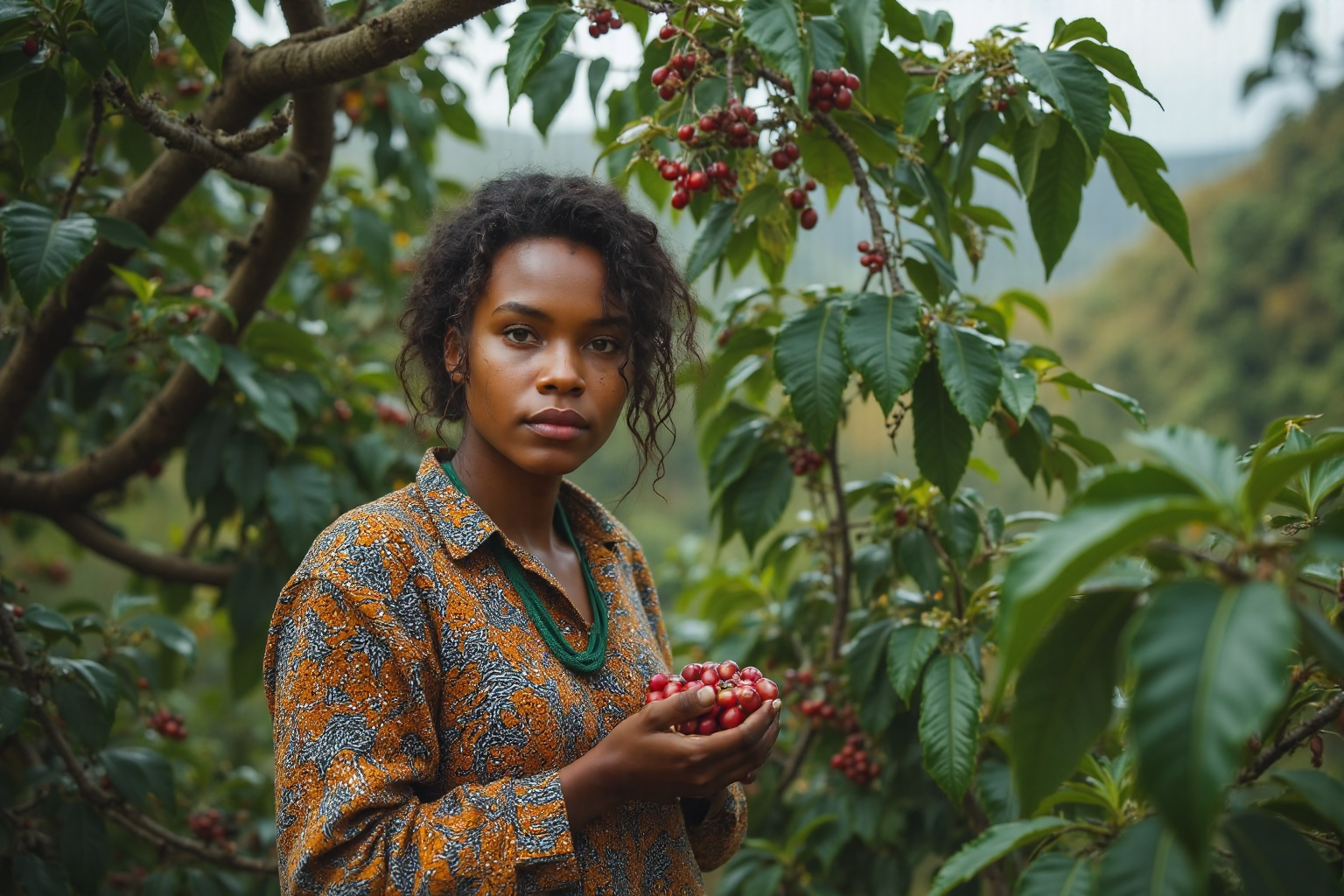Preserving the Cradle of Coffee: A Journey into Ethiopian Forest Conservation
Ethiopia, the birthplace of Arabica coffee, holds within its lush highlands a treasure trove of biodiversity: wild coffee forests, vital to the future of coffee globally. These forests are not merely picturesque landscapes; they are dynamic ecosystems and a living library of coffee’s genetic diversity, crucial for protecting the crop from diseases, bolstering its resilience to the escalating pressures of climate change, and contributing to the captivating flavor profiles that coffee lovers worldwide cherish. The genetic diversity found within these Ethiopian forests serves as a reservoir of traits that can be utilized to develop coffee varieties resistant to coffee leaf rust, coffee berry disease, and other emerging threats, ensuring the long-term viability of coffee production. Researchers and conservationists are working tirelessly to document and preserve these wild coffee populations, recognizing their invaluable contribution to global coffee sustainability. This article delves into the multifaceted efforts underway to conserve these vital ecosystems, exploring the intricate interplay between time-honored traditions, innovative scientific approaches, and shared global responsibility in preserving the cradle of coffee for generations to come. The wild coffee forests of Ethiopia provide critical ecosystem services beyond coffee production, including carbon sequestration, soil conservation, and watershed protection. These forests play a crucial role in mitigating climate change and maintaining the health of the surrounding environment. Protecting these forests requires a holistic approach that considers the ecological, social, and economic needs of the communities that depend on them. Sustainable harvesting practices, fair trade principles, and community-based conservation initiatives are essential components of a successful conservation strategy. Organizations like the Rainforest Alliance and Fairtrade International are working with local communities to promote sustainable coffee farming practices that protect the environment and empower farmers. These partnerships help ensure that coffee production contributes to both ecological preservation and economic development in Ethiopia. The Ethiopian government has also recognized the importance of these forests and has implemented various conservation measures, including the establishment of protected areas and the promotion of sustainable forest management practices. These efforts are crucial for safeguarding the future of coffee and the livelihoods of millions who depend on it.
The Importance of Wild Coffee Genetic Diversity
Ethiopia, the birthplace of Arabica coffee, holds within its lush forests a treasure trove of genetic diversity crucial for the future of coffee worldwide. These wild coffee populations are not merely remnants of the past; they represent a living library of genetic traits that hold the key to resilience against emerging diseases like coffee leaf rust and the increasing pressures of climate change. Protecting these wild coffee forests is not just an environmental imperative, it’s an agricultural necessity for ensuring the long-term viability of coffee production globally. The genetic diversity found in these Ethiopian forests offers a vast pool of potential solutions for coffee breeders and researchers, enabling them to develop varieties that are more resistant to pests, diseases, and changing environmental conditions. For instance, wild coffee varieties often exhibit natural resistance to coffee berry borer, a devastating pest that significantly impacts coffee yields worldwide. By studying and incorporating these resistance genes into cultivated varieties, we can reduce reliance on pesticides and promote more sustainable agricultural practices. Gene banks play a vital role in ex-situ conservation, preserving seeds and genetic material as a safeguard against catastrophic loss in the wild. These collections act as a backup for the irreplaceable genetic resources found in Ethiopia’s forests, ensuring that this valuable heritage is available for future research and breeding efforts. Furthermore, in-situ conservation, which focuses on protecting wild coffee populations within their natural habitats, is equally crucial. This approach not only preserves genetic diversity but also maintains the ecological integrity of the coffee forests, supporting the complex web of life that sustains these unique ecosystems. In-situ conservation efforts often involve working closely with local communities, empowering them to become stewards of these invaluable natural resources. Fair trade practices and equitable benefit-sharing mechanisms are essential components of these initiatives, ensuring that local communities directly benefit from the conservation of their natural heritage. Supporting these communities through sustainable coffee production not only strengthens their livelihoods but also provides a powerful incentive for protecting the forests that harbor wild coffee populations. The economic empowerment of these communities is intrinsically linked to the preservation of the genetic diversity that underpins the global coffee industry. This connection highlights the importance of integrating conservation efforts with sustainable development initiatives, creating a positive feedback loop that benefits both people and the planet. Certification programs, such as Fairtrade International and the Rainforest Alliance, play a crucial role in supporting these efforts by promoting responsible environmental stewardship and ensuring fair prices for farmers who commit to sustainable practices. By choosing certified coffee, consumers can directly contribute to the conservation of Ethiopia’s wild coffee forests and the livelihoods of the communities that depend on them. This collective action is essential for safeguarding the future of coffee and ensuring that this beloved beverage continues to thrive for generations to come.
Balancing Coffee Production with Ecological Preservation
Sustainable harvesting practices are essential for preserving Ethiopia’s unique coffee forests, which represent a vital part of the country’s cultural and ecological heritage. Traditional methods, often passed down through generations of coffee farmers, prioritize minimizing environmental impact and ensuring the long-term health of these precious ecosystems. These time-honored techniques, combined with modern scientific knowledge, offer a promising pathway to balancing the economic benefits of coffee production with the crucial need for ecological preservation. For example, selective harvesting of ripe cherries minimizes disturbance to the forest ecosystem and allows for continuous natural regeneration of coffee plants. This approach contrasts sharply with practices like clear-cutting, which decimate natural habitats and contribute to soil erosion. In Ethiopia, where coffee is deeply intertwined with the cultural identity of many communities, these sustainable harvesting methods also preserve the traditional knowledge and practices that have been honed over centuries. Furthermore, the preservation of these forests supports the rich biodiversity within them, providing habitats for a myriad of plant and animal species, some of which are found nowhere else on Earth. The shade-grown coffee cultivated beneath the forest canopy also contributes to carbon sequestration, helping mitigate the effects of climate change. Fair trade principles are integral to sustainable coffee production in Ethiopia. By ensuring fair prices and empowering local communities, these initiatives create economic incentives for forest conservation and promote social equity within the coffee supply chain. Organizations like Fairtrade International and the Rainforest Alliance certify coffee farms that adhere to strict environmental and social standards, providing consumers with a way to support sustainable practices. This approach ensures that coffee farmers receive a fair price for their beans, encouraging them to continue sustainable harvesting practices and invest in the long-term health of their farms and surrounding forests. Furthermore, these certification programs often support community development projects focused on education, healthcare, and infrastructure, contributing to the overall well-being of coffee-growing regions in Ethiopia. Integrating traditional knowledge with modern scientific research is crucial for enhancing these sustainable practices. For instance, studies on the genetic diversity of wild coffee species growing in Ethiopian forests can inform breeding programs aimed at developing disease-resistant and climate-resilient coffee varieties. This approach not only protects the future of coffee production but also safeguards the livelihoods of millions of people who depend on it. By combining ancestral wisdom with scientific innovation, Ethiopia can pave the way for a sustainable coffee industry that benefits both people and the planet. Agroforestry systems, which integrate trees with coffee cultivation, are another example of this harmonious blend of tradition and science. These systems enhance biodiversity, improve soil health, and provide additional income streams for farmers through the sale of fruits, nuts, or timber. The shade provided by the trees also reduces water stress on coffee plants, a critical factor in a region increasingly affected by climate change. By embracing these integrated approaches, Ethiopian coffee farmers are not only preserving their cultural heritage but also actively contributing to global efforts in environmental conservation and climate change mitigation.
Empowering Communities Through Sustainable Coffee
The fate of Ethiopia’s coffee forests rests largely in the hands of the communities that call these landscapes home. Generations of accumulated knowledge about the forest ecosystem, coupled with traditional management techniques, make these communities indispensable partners in conservation. Their intimate understanding of the delicate balance between coffee cultivation and ecological preservation is an invaluable asset. For example, in the Yayu Biosphere Reserve, local communities have long practiced selective harvesting of wild coffee, ensuring the preservation of the forest structure and biodiversity. This traditional approach not only safeguards the long-term health of the forest but also protects the genetic diversity of wild coffee, crucial for the resilience of the global coffee supply. Sustainable coffee production offers a pathway to empower these communities both economically and socially. By supporting fair trade practices and equitable benefit sharing, we can ensure that the custodians of these vital ecosystems receive fair compensation for their stewardship. This economic empowerment translates to improved livelihoods, better access to education and healthcare, and greater community resilience. One example is the Oromia Coffee Farmers Cooperative Union, which works directly with farmers to ensure fair prices and invest in community development projects. Fairtrade certification enables consumers to consciously support these initiatives, creating a virtuous cycle that benefits both the environment and the communities that protect it. Furthermore, ensuring equitable access to resources like land ownership, credit, and training is essential for long-term community empowerment. Secure land tenure provides farmers with the incentive to invest in sustainable practices, knowing they will reap the long-term benefits. Access to credit allows them to invest in improved farming techniques and infrastructure, while training empowers them with the knowledge and skills to adapt to changing environmental conditions and market demands. This holistic approach to community empowerment not only strengthens local economies but also reinforces the crucial link between human well-being and environmental sustainability. By investing in the well-being of these communities, we are effectively investing in the future of coffee itself. Supporting organizations that work directly with local communities is crucial for maximizing the impact of conservation efforts. These organizations often have deep roots in the communities they serve, enabling them to effectively bridge the gap between traditional knowledge and modern scientific approaches. They can facilitate training programs on sustainable farming practices, promote access to fair trade markets, and advocate for policies that protect community land rights. By collaborating with these local partners, we can ensure that conservation efforts are not only effective but also culturally sensitive and genuinely beneficial to the communities involved. The preservation of Ethiopian coffee forests is not merely an environmental imperative; it is an investment in the future of coffee and the livelihoods of those who depend on it.
Traditional Wisdom Meets Modern Science
Ethiopian coffee cultivation is deeply intertwined with traditional forest management techniques, representing a centuries-old symbiotic relationship between people and the environment. These time-honored practices, passed down through generations, demonstrate a profound understanding of ecological balance and sustainable resource management. Shade-grown coffee, agroforestry systems, and natural pest control are integral to these traditions, showcasing a harmonious approach to coffee production that prioritizes both quality and conservation. For example, the traditional practice of cultivating coffee under the canopy of diverse forest trees provides natural shade, reducing the need for irrigation and minimizing water stress on the delicate ecosystem. This method also protects coffee plants from extreme temperatures, promotes biodiversity by preserving natural habitats, and contributes to carbon sequestration, mitigating the effects of climate change. Integrating these time-honored methods with modern scientific knowledge can enhance conservation outcomes and ensure the long-term health of these vital ecosystems. The dense canopy created by shade trees acts as a natural barrier against pests and diseases, reducing the need for chemical interventions. This natural pest control not only protects the environment but also results in a healthier and more flavorful coffee bean, highly valued by connoisseurs worldwide. Furthermore, the diverse plant life in these agroforestry systems helps maintain soil health, prevents erosion, and provides additional income sources for local communities through the harvest of fruits, spices, and medicinal plants. Studies have shown that shade-grown coffee farms support a significantly higher number of bird species compared to conventional sun-grown plantations, highlighting the critical role these traditional systems play in preserving biodiversity. Organizations like the Rainforest Alliance and Fairtrade International are working to promote and certify these sustainable practices, ensuring that farmers receive fair prices for their environmentally friendly coffee and empowering them to continue their stewardship of these crucial forest ecosystems. By supporting these certified products, consumers can directly contribute to the preservation of Ethiopia’s unique coffee forests and the livelihoods of the communities that depend on them. Modern scientific research can further refine these traditional practices, optimizing shade tree selection for enhanced carbon sequestration and biodiversity benefits. Scientific analysis of soil composition and nutrient cycling can inform sustainable fertilization methods, improving coffee yields while minimizing environmental impact. By combining ancestral knowledge with scientific innovation, Ethiopia can pave the way for a truly sustainable coffee future, one that preserves both the rich cultural heritage and the invaluable ecological treasures of its coffee forests. This holistic approach not only safeguards the future of coffee but also contributes to the overall well-being of the communities that cultivate it, ensuring a sustainable and equitable future for generations to come.
The Impact of Certification Programs
Certification programs play a crucial role in fostering sustainable coffee production in Ethiopia and enhancing market access for local farmers. Organizations like Fairtrade International and the Rainforest Alliance offer structured frameworks that promote responsible environmental stewardship, social equity, and economic viability, contributing significantly to the long-term health of Ethiopia’s vital coffee forests. These programs establish specific standards for coffee cultivation, processing, and trade, encompassing criteria such as environmental protection, fair labor practices, and community development. By adhering to these standards, Ethiopian coffee farmers gain access to premium markets and receive better prices for their beans, empowering them to invest in sustainable practices and improve their livelihoods. For consumers, these certifications offer a guarantee that their coffee purchases support ethical and environmentally sound practices, creating a virtuous cycle that benefits both producers and the environment. Furthermore, certification programs often provide training and resources to farmers, enabling them to adopt climate-resilient agricultural techniques and adapt to the growing challenges posed by a changing climate. For example, training on water conservation methods, shade-grown coffee cultivation, and diversification of crops enhances the resilience of coffee farms and contributes to the overall health of the ecosystem. These programs also emphasize the importance of preserving wild coffee varieties, recognizing their vital role in maintaining genetic diversity and ensuring the long-term sustainability of coffee production. In Ethiopia, where wild coffee forests are a crucial part of the country’s natural heritage, certification programs contribute to their protection by promoting sustainable harvesting practices and supporting community-based conservation efforts. Fairtrade, for instance, mandates that certified cooperatives invest a portion of their premium in community development projects, often focusing on environmental conservation and social welfare initiatives. This participatory approach empowers local communities to take ownership of their natural resources and manage them sustainably for future generations. The Rainforest Alliance, with its focus on biodiversity conservation, encourages practices like agroforestry, which integrates trees into coffee farms, creating a more diverse and resilient ecosystem. This approach not only benefits coffee plants by providing shade and natural pest control but also supports local wildlife and contributes to carbon sequestration. In addition to environmental benefits, these certifications also promote social equity by ensuring fair wages, safe working conditions, and access to education and healthcare for coffee farmers and their families. This holistic approach to sustainability recognizes the interconnectedness of environmental, social, and economic factors in creating a thriving coffee sector in Ethiopia. By supporting certified Ethiopian coffee, consumers contribute directly to the preservation of these unique ecosystems and the well-being of the communities that depend on them.
Adapting to a Changing Climate
The looming shadow of climate change presents a significant threat to the delicate balance of Ethiopia’s coffee forests, jeopardizing not only the future of this cherished beverage but also the livelihoods of millions who depend on its cultivation. Rising temperatures, erratic rainfall patterns, and increased frequency of extreme weather events are already impacting coffee production, disrupting traditional farming practices and stressing the resilience of these vital ecosystems. Adapting to these evolving conditions is not merely a matter of preference, but a necessity for ensuring the survival of Ethiopian coffee and the communities that nurture it. Promoting drought-resistant coffee varieties is crucial for mitigating the effects of water scarcity. These varieties, often developed through careful selection and breeding programs, possess enhanced tolerance to dry conditions, enabling them to thrive in regions facing reduced rainfall. Implementing water conservation techniques, such as rainwater harvesting and efficient irrigation systems, is equally essential for optimizing water use and minimizing the impact of droughts. Diversifying livelihoods beyond coffee cultivation offers an additional layer of resilience, reducing dependence on a single crop and providing alternative income streams in the face of climate-related challenges. For example, beekeeping, fruit tree cultivation, and sustainable tourism can complement coffee production and provide economic stability during periods of hardship. Furthermore, empowering local communities to actively participate in climate adaptation initiatives is paramount. Their intimate knowledge of the local environment, coupled with their traditional resource management practices, makes them invaluable partners in developing and implementing effective adaptation strategies. Supporting community-led initiatives, such as reforestation projects and sustainable forest management programs, can enhance both ecological resilience and community well-being. The integration of traditional knowledge with modern scientific advancements is essential for navigating the complexities of climate change. Researchers are working to identify and preserve wild coffee varieties that possess natural resistance to pests, diseases, and drought. These genetic resources hold the key to developing climate-resilient coffee varieties that can withstand the challenges of a changing world. Furthermore, exploring innovative agroforestry techniques, which combine coffee cultivation with other tree species, can enhance biodiversity, improve soil health, and create more resilient agricultural landscapes. Certification programs, such as Fairtrade International and Rainforest Alliance, play a vital role in supporting climate adaptation efforts. These programs provide farmers with access to training, resources, and premium market prices for sustainably produced coffee, incentivizing the adoption of climate-smart agricultural practices. By promoting responsible environmental stewardship and social equity, these certifications contribute to the long-term health of coffee forests and the well-being of coffee-growing communities. Continued investment in research, innovation, and community engagement is essential for building a climate-resilient future for Ethiopian coffee. By embracing a holistic approach that combines scientific expertise with traditional wisdom, we can safeguard this invaluable resource for generations to come and ensure that the aroma of Ethiopian coffee continues to enrich our lives.



